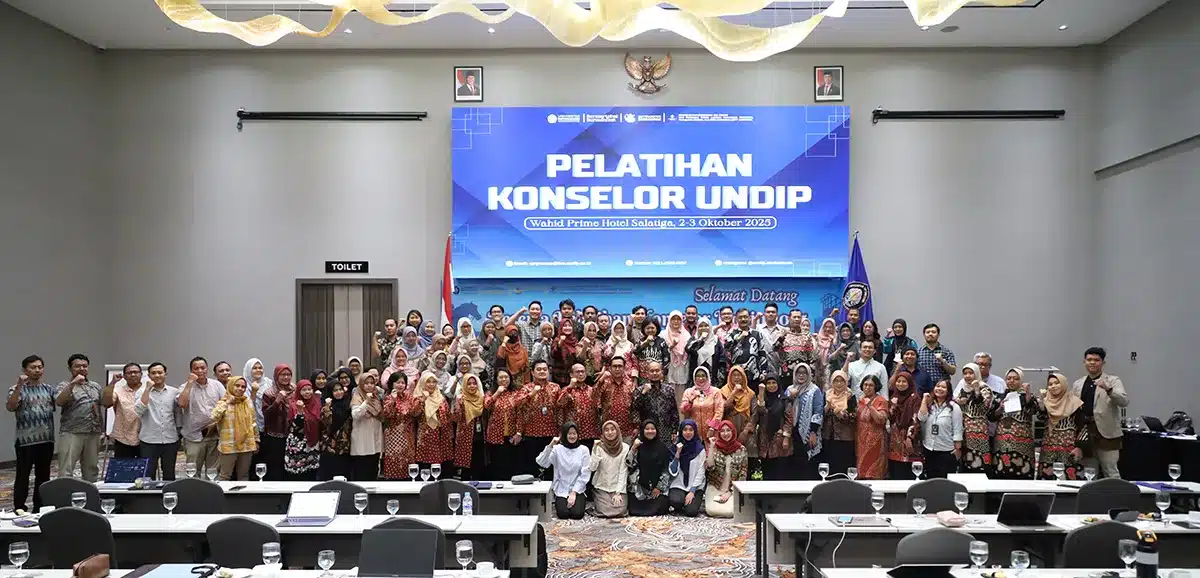UNDIP, Salatiga (October 3, 2025) – Universitas Diponegoro (UNDIP), through its Center for Consultation Services, Disability, Discipline, and Student Ethics (UPT LKDPDEM), held a Counselor Training Program for representatives from various faculties and schools within the university on October 2–3, 2025, in Salatiga City. The event was attended by 100 participants, consisting of Vice Deans for Academic and Student Affairs, 76 faculty/school counselors, 2 external counselors, and staff from the Directorate of Student Affairs and Alumni.
The two-day program featured three professional speakers specializing in mental health and student psychology: dr. Fanti Saktini, M.Si.Med., Sp.K.J.; Lusi Nur Ardhiani, S.Psi., M.Psi., Psikolog.; and Amalia Rahmandani, S.Psi., M.Psi., Psikolog.
The training was officially opened by Vice Rector I for Academic and Student Affairs, Prof. Dr.rer.nat. Ir. Heru Susanto, S.T., M.M., M.T. In his remarks, Prof. Heru emphasized the importance of the university’s role in accompanying students who experience mental distress or psychological disorders. He noted that as UNDIP advances toward becoming a World-Class University, attention to students’ mental health must remain a top priority.
Academic achievements lose their meaning when students suffer from depression without proper support. Prof. Heru stated, “We must take proactive steps to ensure our students are protected from harmful situations. When they experience depression, we must be present. It’s also essential to enhance both the speed and quality of our counseling services.”
Prof. Heru also expressed deep gratitude and appreciation to lecturers and educational staff who sincerely support students through their difficulties. Though their efforts often go unnoticed, he said, their impact is profound.
“The greatest joy for a counselor is seeing a student they’ve supported recover from stress. Every act of sincere attention and help is a seed of goodness that will become a source of salvation,” said Prof. Heru.
In his report, Edy Surahmad, S.Pd., M.Si., Director of Student Affairs and Alumni, explained that the counselor training serves as a concrete step to strengthen counselors’ capacity in serving students. “This training aims to enhance the competence of counselors in counseling and guidance, to create a psychologically healthy academic and non-academic environment, and to reinforce a healthy and inclusive campus culture,” Edy stated.
Through this program, UNDIP aims to provide significant benefits for all counselors by enhancing both their theoretical understanding of counseling principles and ethics and their practical skills in addressing student issues, such as anxiety, depression, and social challenges. The training also serves as a platform for building a counselor network to share knowledge and strengthen the university’s psychological support system.
“We believe this initiative marks an important first step in strengthening the role of counselors in maintaining students’ mental health, fostering a caring campus environment, and supporting the realization of a dignified and beneficial healthy campus program,” Edy added.
In the first session, dr. Fanti Saktini presented on “Managing Psychiatric Emergencies.” She emphasized the importance of counselor preparedness in responding to mental health crises among students. Situations such as suicide attempts, acute psychosis, or extreme panic attacks require early detection and rapid intervention to prevent harm to oneself or others.
This session included case studies and role-playing exercises to train counselors in conducting emergency interviews, stabilizing students’ emotions, and ensuring environmental safety. She also discussed referral protocols across university units, the importance of accurate documentation, and cross-department collaboration in post-crisis recovery.
The second speaker, Lusi Nur Ardhiani, S.Psi., M.Psi., Psikolog., delivered a session on “Understanding and Managing Non-Suicidal Self-Injury (NSSI) in Students.” NSSI refers to self-harming behavior without suicidal intent, often used as an emotional coping mechanism among students under stress.
Counselors were encouraged to respond with empathy and non-judgment, while helping students develop simple safety plans. Lusi also emphasized the importance of referring cases to psychologists or psychiatrists when they exceed the university’s handling capacity.
The third speaker, Amalia Rahmandani, S.Psi., M.Psi., Psikolog., presented “Post-Traumatic Growth.” She explained that post-traumatic growth is an individual’s ability to rise and experience positive transformation after severe trauma. It is not merely recovery but becoming stronger through reflection, finding meaning, and sustained social support.
She elaborated on five key domains of post-traumatic growth: relationships with others, new opportunities, personal strength, spiritual and existential transformation, and appreciation of life. Real case studies were shared to illustrate how students who have experienced complex trauma can rediscover hope through meaningful, though challenging, processes.
This training marks a strategic step for UNDIP in building a campus that is safe, responsive, and supportive of mental health within the academic community. By strengthening counselor capacity, UNDIP not only delivers more responsive services but also fosters a culture of empathy and collective awareness in helping students through crises.
The initiative also contributes to achieving the Sustainable Development Goals (SDGs), particularly SDG 3 (Good Health and Well-Being), SDG 4 (Quality Education), and SDG 16 (Peace, Justice, and Strong Institutions).
Through this program, UNDIP reaffirms its commitment to uphold human dignity and promote student well-being—embodying the spirit of “Noble and Valuable UNDIP”—and supporting the “Diktisaintek Berdampak” program to advance transformative and sustainable higher education. (Public Communication/UNDIP/Dhany)










